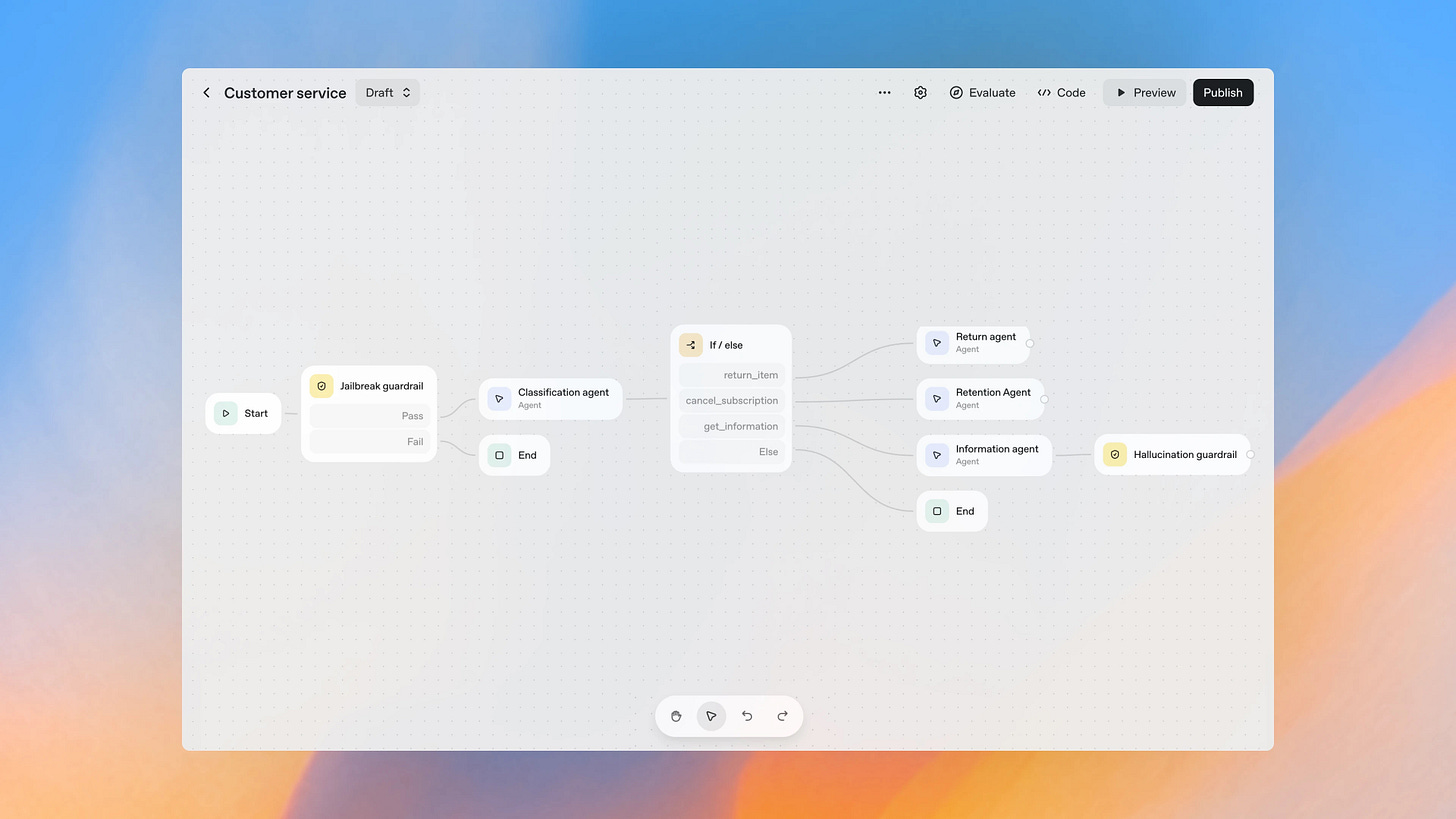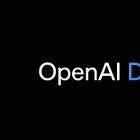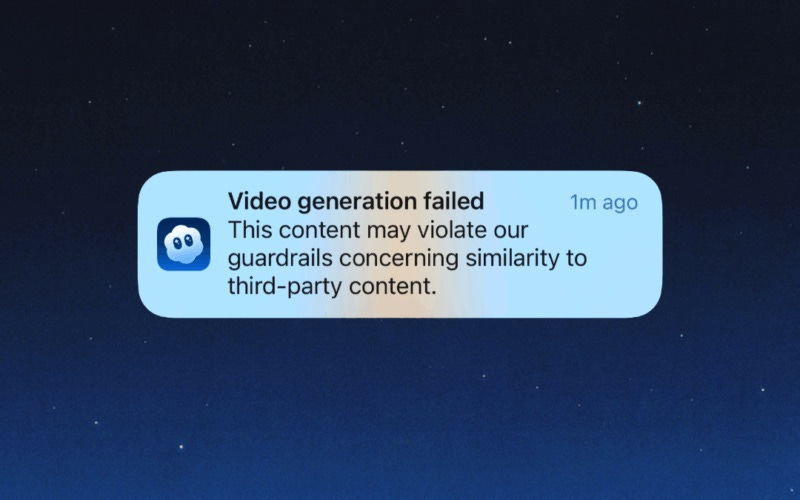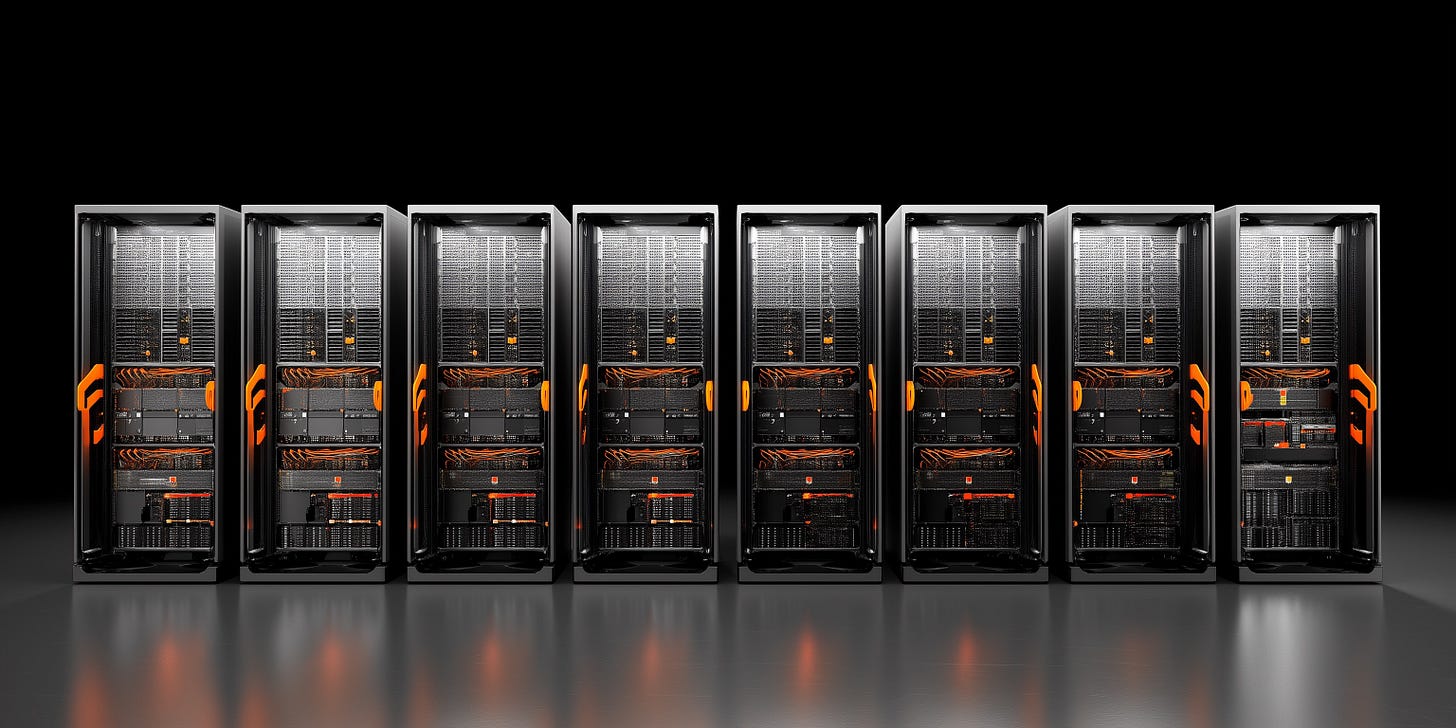OpenAI: DevDay
OpenAI’s annual developer conference, DevDay, was this week.
The announcements:
ChatGPT Apps SDK, built on MCP, to let developers create apps inside of ChatGPT and launched with Canva, Coursera, Figma, Spotify, Zillow, and more.
AgentKit, a toolkit for building and deploying AI agents, including a no-code Agent Builder interface.
New Codex features: a Slack integration for delegating tasks or asking questions, a Codex SDK, and new admin tools
And API updates, including GPT-5 Pro, Sora 2 (in preview), and gpt-realtime-mini, a voice model that is 70% cheaper than gpt-realtime.
The big picture:
One easy comparison here is Facebook: turn a popular product into a “front door to the web” by letting developers build on top of it, then monetize through revenue-sharing or promoted placements. However, the technology arguably has the potential for more harm, given the sensitive nature of many ChatGPT conversations.
Another is Microsoft: OpenAI’s strategy of doing everything - consumer, enterprise API, infrastructure deals - positions it as the linchpin of the entire AI bubble and mirrors Windows’ peak when Microsoft could answer every strategic question with “Yes,” before mobile forced focus.
But perhaps Sam Altman’s preferred comparison is Apple: he took to the stage with Jony Ive to discuss their collaboration on a “family of devices” - though specifics remain scarce beyond a late 2026 potential launch and a philosophy focused on human wellbeing over productivity.
Elsewhere in the FAANG free-for-all:
Adobe launches AI agents tailored for B2B marketers within its Adobe Experience Platform, after launching AI agents aimed at consumer marketing in September.
AWS launches Quick Suite, a chatbot and set of AI agents that can analyze sales data, produce reports, and summarize web content, set to replace Q Business.
Google Cloud launches Gemini Enterprise, designed to help employees automate tasks and generate content across departments, priced at $30 per user per month.
Google debuts an AI bug bounty program offering security researchers up to $30K for finding prompt injections, jailbreaks, and alignment issues in its products.
Google DeepMind unveils CodeMender, an AI agent that detects, patches, and rewrites vulnerable code to prevent exploits by leveraging Gemini Deep Think models.
And Anthropic and IBM partner to make Anthropic’s Claude models available in IBM’s latest IDE for large businesses, with IBM aiming to add Claude to more products soon.
OpenAI: Sora
The Internet is continuing to deal with the release of Sora, OpenAI’s AI-powered TikTok competitor. As Sora-created content continues to go viral, the company is releasing new guardrails and attempting to preempt potential legal challenges.
Between the lines:
Initially, the company took a “ask for forgiveness, not permission“ approach on copyright, requiring creators to opt out rather than opt in to using their likenesses. And indeed, users were generating controversial content featuring copyrighted characters and public figures.
But in the days since launch, OpenAI has backpedaled: first by adding granular controls for rightsholders over how characters can be used, and then by rapidly expanding content restrictions (now, even public domain characters like Winnie the Pooh and Dracula are blocked).
Part of the challenge seems to be Sora’s rapid growth - despite being invite-only, the app hit the top of the App Store this week. It has reportedly reached 1 million downloads in under five days, faster even than ChatGPT.
And there’s also the matter of AI-powered misinformation: even though Sora 2 includes visual watermarks on all generated videos, numerous websites have emerged that can remove these watermarks in seconds.
Elsewhere in frontier models:
Google releases the Gemini 2.5 Computer Use model, built on Gemini 2.5 Pro’s capabilities to power agents that can interact with UIs, in preview via the API.
Samsung introduces the Tiny Recursion Model, a 7M-parameter model that can outperform LLMs 10,000x larger, like Gemini 2.5 Pro and o3-mini, on specific problems.
Huawei’s Zurich Lab unveils SINQ, an open-source quantization method that it claims can reduce LLM memory use by 60-70% without significant quality loss.
And OpenAI updates GPT-5 Instant to better recognize and support people in distress, with ChatGPT routing such sensitive parts of conversations to the model.
OpenAI: AMD
OpenAI struck a major deal with AMD to deploy 6 gigawatts of AI chips over multiple years, and potentially giving the AI company a 10% stake in the chipmaker. But the deal is only adding to fears of a potential AI bubble.
Why it matters:
The deal structure is novel - OpenAI can purchase up to 160 million AMD shares with tranches vesting as capacity milestones are met, culminating when AMD stock hits $600.
OpenAI is aggressively diversifying its supply chain - including a $100B Nvidia deal, $10B Broadcom partnership, and deals with Samsung and SK Hynix - and is also striking multi-billion-dollar deals on compute with companies like Oracle ($300B) and CoreWeave ($22B).
These enormous capital commitments raise critical questions about AI economics: whether these investments can generate proportional returns, and what happens if the current wave of AI enthusiasm wanes before these trillion-dollar bets pay off - especially as more and more deals are of a circular nature.
It doesn’t help that Big Tech companies are increasingly financing their AI infrastructure buildouts through private debt and special purpose vehicles that keep borrowing off their balance sheets - a tactic reminiscent of the subprime mortgage crisis.
Elsewhere in AI anxiety:
A study finds that as few as 250 malicious documents can produce a “backdoor” vulnerability in an LLM, regardless of model size or training data volume.
A survey of 1,000 US highschool students finds that nearly one in five say they or someone they know has had a romantic relationship with AI.
MrBeast, who is set to earn an estimated $85M in 2025, says AI-generated videos could threaten creators’ livelihoods, calling it “scary times” for the industry.
A study found that by late 2024, around 24% of English-language corporate press releases and 14% of UN press releases used LLM-assisted writing.
Deloitte says it will partially refund payment for an AU$439K Australian government report with multiple errors, after admitting it was partly produced by AI.
And an investigation finds rampant caste bias in ChatGPT and Sora, with a researcher also finding caste bias in Sarvam AI, which touts itself as a sovereign AI for India.
But wait, there’s more (OpenAI):
Data from 300K+ pull requests shows OpenAI is catching up to Anthropic in AI coding, with Codex achieving a 74.3% success rate vs. Claude Code’s 73.7% in code approvals.
OpenAI expands its ~$5 ChatGPT Go plan to 16 more Asian countries, including Malaysia, Pakistan, the Philippines, and Vietnam.
The company raised concerns about difficulties competing with entrenched companies like Google, Microsoft, and Apple in a September EU meeting.
There have been over 800+ applications - narrowed down to ~20 finalist sites - for upcoming Stargate data center locations in the US.
OpenAI and Anthropic are considering using investor funds to settle potential claims from multibillion-dollar lawsuits as insurers balk at covering AI risks.
And Sam Altman discusses OpenAI’s unifying vision, infrastructure deals, ChatGPT apps, Instant Checkout, Sora, and more in a wide-ranging interview.
Things happen
VCs have invested $192.7B in AI startups so far this year. AI browser Dia is now available on macOS. A look at China’s AI toy boom targeting North America, Europe, and Asia. Researchers are using synthetic diamonds to cool AI data center chips. Anthropic releases Petri, an open-source tool for AI safety testing using agents. How AI is speeding up the search for new battery materials. The top 50 AI companies that startups pay for. Data hoarder uses AI to create searchable database of Epstein files. Debt tied to AI companies hits $1.2T, the largest segment in investment-grade market. You have 18 months. Jeff Bezos says AI is in a bubble but society will benefit. Robin Williams’ daughter: stop sending AI videos of my dad. The EU outlines its Apply AI Strategy to speed up adoption. Why do LLMs freak out over the seahorse emoji? Former PM Rishi Sunak joins Microsoft and Anthropic as senior adviser. The inside negotiations over California’s SB 53. Draft proposal outlines the EU’s strategy to “strengthen AI sovereignty”. xAI is set to spend $18B+ to acquire 300K more Nvidia chips for Colossus 2. America is now one big bet on AI.








I’m also worried about the circular deals and financing. I recognize there’s no GPU that isn’t used at 100% capacity right now, however trillions of CapEx, even with the boldest estimates, feels off. However, I don’t want to miss the proverbial party so I’ll likely keep my existing positions
I'm pretty excited about what we'll be able to do w/the builders, and also share your concerns about the rest of the world using these tools.
Is there any way only I can use them, and not everyone else? That seems safer.